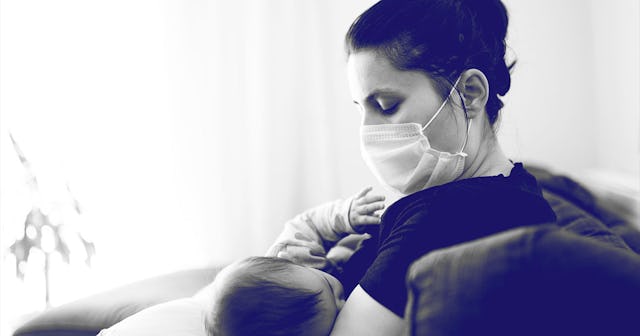We Can't Forget About Postpartum Moms During The Pandemic

On March 11, the World Health Organization declared COVID-19 a global pandemic and then on April 10, a close friend gave birth to a baby. The weeks leading up to the baby’s birth were full of stress, uncertainty, and questions with no easy answers. Where would she give birth? Would her partner be allowed in the room? Who would watch her toddler while they in the hospital?
After the baby was born those questions ceased, but the stress and anxiety didn’t and new questions emerged. The baby didn’t sleep at night. She needed support breastfeeding. Groceries weren’t easy to come by, her friends and family couldn’t come lend a hand, and she had a toddler with too much energy and nowhere to go. My friend, the new mom, was recovering from a stressful delivery (while wearing a mask), functioning on virtually no sleep, and unable to access her usual lines of support, which she desperately needed (in addition to the helpful partner by her side.)
My friend’s story isn’t uncommon. Babies didn’t get the memo that COVID-19 had brought the world to a screeching halt. They still demanded to be born. And new moms were faced with new challenges in that already difficult time in the weeks after birth. Isolated from support systems, navigating a world no one had a map to navigate, and doing so while virtually sleep deprived, new moms are being asked to do the impossible.
It isn’t surprising, then, that a recent study found that since the pandemic, new moms are more likely to experience anxiety and depression.
The study surveyed 900 eligible women who were either pregnant or in their first year after delivery, and identified “a substantial increase in the likelihood of maternal depression and anxiety during the COVID-19 pandemic.” Comparing pre-pandemic levels of depression and anxiety, the study found that 40.7% of women experienced depression during the pandemic as compared to 15% pre-pandemic. When it comes to anxiety, 72% of respondents experienced moderate to high anxiety during the pandemic, as opposed to 29% before the pandemic.
Scary Mommy got in touch with Lisa Tremayne, Director at the Center for Perinatal Mood and Anxiety Disorders (PMADs) at Monmouth Medical Center, and Lesley Neadel, a Social Worker at the same, to give meaning to those numbers.
Tremayne noted that calls to the Center have tripled since the pandemic began, which is an observation that supports the study’s finding that anxiety and depression increased substantially.
The bigger question to understand is why. In an email, Tremayne writes, “PMADs [perinatal mood and anxiety disorders] thrive on isolation and fears, and COVID is all about isolation and fear. Pregnant and new moms are caught in an impossible web, scared to leave the safety of their homes and yet so desperately lonely, searching for connection of women in the same season.” It’s a perfect storm for new moms who are already vulnerable to mood and anxiety disorders. According to the study, “depression and anxiety affect one in seven women during the perinatal period” when there isn’t a pandemic raging outside.
Mladen_Kostic/Getty
The pandemic has only added to the intrusive “what if” fears playing on a constant low loop in new mother’s minds, according to Tremayne, and when those thoughts are dominating, it becomes difficult to function in daily life. In addition, “all the questions that are ‘normal’ are very intensely ramped up.” Nine out of 10 of the calls PMADs is fielding, as compared to 7 or 8 pre-pandemic, are from women who are experiencing anxiety and panic attacks that they were able to manage in pre-pandemic times.
As a result, we need to make sure new mothers’ mental health is a top priority. The study concluded that staying physically active during the pandemic “could be a helpful tool for pregnant and postpartum women,” especially if access to other places for diagnosis and treatment is difficult. The authors suggest at least 150 minutes of moderate intensity physical activity a week.
Neadel offered a more comprehensive list of suggestions for new mothers. “The most effective treatment is the combination of individual therapy, peer-to-peer support, and medication, if needed, to help with racing thoughts or overwhelming sadness.” She noted that taking time for self-care and protecting your own eating and sleep as much as possible was critical, as was finding the right support group. Many new mom support groups successfully made the switch to virtual platforms, including Jen Schwartz at Motherhood Understood, TheBloomFoundation.org, and PostpartumProgress.com.
Often identifying the symptoms or recognizing that a new mother is suffering is difficult. “[N]ew moms who are suffering may not present as you imagine depression would,” Neadel notes, and urges partner to pay attention to symptoms that match anxiety or OCD, and to open space and listen to the new mom’s feelings. “Don’t assume that because she looks fine, she is fine. If mom seems “not like herself” or is saying that to you—it’s time to call for help,” writes Neadel.
New mothers are an already vulnerable group thanks to the hormones, sleep deprivation, and chemical changes to the brain both create, notes Tremayne. The pandemic only serves to exacerbate the difficulties new moms face, as it’s forcing them to be separated from family and friends who might help and adding untold reams of uncertainty into the everyday.
It’s important to remember, however, that PMADs “is an OB complication and not a lifetime psychiatric illness,” writes Tremayne, who adds, “It is temporary and treatable, and you are not ever alone when you’re suffering.”
“Everyone who gets help, gets better,” writes Tremayne. “With PMAD-specific treatment, by trained and specialized professionals, every mama gets back to herself.”
This article was originally published on